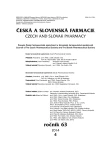-
Medical journals
- Career
Prick of conscience in the pharmaceutical profession
Authors: Božena Macešková; Michaela Hobzová
Authors‘ workplace: Ústav aplikované farmacie FaF, Veterinární a farmaceutická univerzita, Brno
Published in: Čes. slov. Farm., 2014; 63, 174-177
Category: Original Articles
Overview
The work of the pharmacist in a pharmacy requires from him not only to solve professional and economic issues, but often the ethical ones as well. For a patient’s good it is necessary to choose a morally correct decision, but the fulfilment of any patient’s wish according to his or her own ideas of good is not a law for the health worker. The paper describes the situations when the pharmacist when fulfilling the requirement of the patient (often in the form of a medical prescription) may feel prick of conscience. A questionnaire survey has revealed that prick of conscience confronts more often those who are being trained for the profession than those who already practise it. The right for prick of conscience is considered unfounded by some pharmacists with practical experience, whereas undergraduates view it as a possibility of expressing one’s own attitude. The paper analyzes the issues which in both categories of respondents are considered to be prick of conscience: oral hormonal contraception, including postcoital contraception, and preparations produced from the cells of aborted embryos.
Keywords:
conscience • prick of conscience • hormonal contraception • postcoital contraception • pharmacist
Sources
1. Haškovcová H. Lékařská etika. 3. vyd. Praha: Galén 2002.
2. Kořenek J. Lékařská etika. 1. vyd. Praha: Triton 2000.
3. Deklarace prav počatého dítěte. http://euportal.parlamentnilisty. cz.
4. Skočovský K. Akceptabilita metod přirozené kontroly početí: dimenze a determinanty. Brno 2007. Dizertační práce. Masarykova univerzita v Brně. Filozofická fakulta.
5. Databáze léků – doprovodné texty. http://www.sukl.cz.
6. Rob L., Martan A., Citterbalt K. Gynekologie. 1. vyd. Praha: Galén 2008.
7. Larimore W. L., Stanford J. B. Postfertilization effects of oral contraceptives and their relationship to informed consent. Archives of Family Medicine 2000; 9, 126–133.
8. Dye H. M., Stanford J. B., Alder S.C., Kim S. H., Murény P. A. Women and postfertilization effects of birth control: consistency of beliefs, intentions and reported use. BMC Women’s Health 2005; 5, 11.
9. de Irala J., Lopez del Burgo C., Lopez de Fez C. M., Arredondo J., Mikolajczyk R. T., Stanford J. B. Women’s attitudes towards mechanisms of action of family planning methods: survey in primary health centres in Pamplona, Spain BMC Women’s Health 2007; 7, 10.
10. Čepický P., Líbalová Z. Postoje žen ke kombinované orální kontracepci. Moderní gynekologie a porodnictví 2003; 12(1, Suppl. B), 191–208.
11. Uzel R. Antikoncepční kuchařka: aneb cesty k sexuálnímu zdraví. 1. vyd. Praha: Grada Publishing 1999.
12. Keková T. Informovanost žen o rizicích v souvislosti s užíváním hormonální antikoncepce. Olomouc 2014. Diplomová práce. Univerzita Palackého v Olomouci. Pedagogická fakulta.
13. Šmíd M. K podstate a zmyslu slobody svedomia a slobody náboženstva: In: Moravčíková M. Výhrada vo svedomí – Conscientious Objection. Bratislava: Ústav pre vzťahy štátu a církví 2007.
14. Madleňáková L. Výhrada svědomí jako součást svobody myšlení, svědomí a náboženského vyznání. 1. vyd. Praha: Linde 2010.
15. Zákon č. 372/2011 Sb. o zdravotních službách a podmínkách jejich poskytování, v platném znění.
Labels
Pharmacy Clinical pharmacology
Article was published inCzech and Slovak Pharmacy

2014 Issue 4-
All articles in this issue
-
Studies of local anaesthetics: Part 205*
Studies of stability of heptacainium chloride and carbisocainium chloride using an accelerated non-isothermal test - In vivo testing of new ultrashort-acting β-blockers with the effect on systolic blood pressure and heart rate
- Prick of conscience in the pharmaceutical profession
- Rationalization in 20th-century Czechoslovak pharmacy practice – Commission for Rationalization and Standardization in Medicine, Veterinary Medicine and Pharmacy – Part 2*
- Metabolic syndrome – dysregulation of adipose tissue endocrine function
-
Studies of local anaesthetics: Part 205*
- Czech and Slovak Pharmacy
- Journal archive
- Current issue
- Online only
- About the journal
Most read in this issue- Prick of conscience in the pharmaceutical profession
- Metabolic syndrome – dysregulation of adipose tissue endocrine function
- Rationalization in 20th-century Czechoslovak pharmacy practice – Commission for Rationalization and Standardization in Medicine, Veterinary Medicine and Pharmacy – Part 2*
- In vivo testing of new ultrashort-acting β-blockers with the effect on systolic blood pressure and heart rate
Login#ADS_BOTTOM_SCRIPTS#Forgotten passwordEnter the email address that you registered with. We will send you instructions on how to set a new password.
- Career

